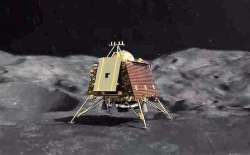Will NASA be able to locate Vikram lander this time?
The US space agency had earlier said its LRO had passed over the landing site of Vikram on September 17 and acquired a set of high-resolution images of the area.

Its the day Indian space scientists and Chandrayaan-2 enthusiasts had been waiting for. The US space agency NASA had promised hope of some news on the Vikram front by Tuesday after its Lunar Reconnaissance Orbiter (LRO) flyby over the site where Indian lunar lander might have landed.
Has the Indian moon lander Vikram been found or not is a question that the US space agency National Aeronautics and Space Administration (NASA) will soon be able to answer.
A NASA official had earlier told IANS in New York that on October 14, its Lunar Reconnaissance Orbiter (LRO) would fly over the site, where Vikram might have landed.
The US space agency had earlier said its LRO had passed over the landing site of Vikram on September 17 and acquired a set of high-resolution images of the area.
However, the Lunar Reconnaissance Orbiter Camera (LROC) team was not able to locate or image the lander, NASA had said.
"It was dusk when the landing area was imaged and thus large shadows covered much of the terrain; it is possible that the Vikram lander is hiding in a shadow. The lighting will be favourable when LRO passes over the site in October and once again attempts to locate and image the lander," NASA had said.
According to NASA, Vikram attempted a landing on a small patch of lunar highland smooth plains between Simpelius N and Manzinus C craters.
This event was India's first attempt at a soft landing on the Moon.
The US agency said Vikram's targeted landing site was located about 600 kilometres (370 miles) from the south pole in a relatively ancient terrain (70.8AoS latitude, 23.5AoE longitude).
Also Read | From Moon to Mars, NASA astronauts to wear special spacesuits
Also Read | NASA captures spectacular view of Jupiter's swirling clouds
